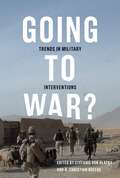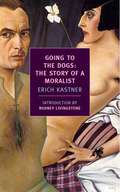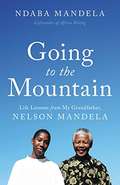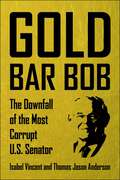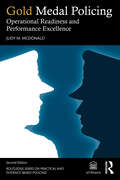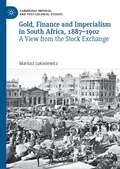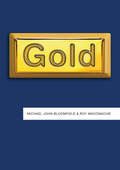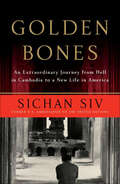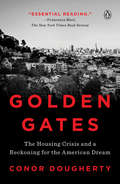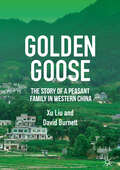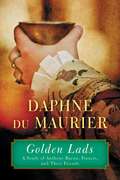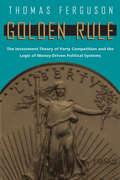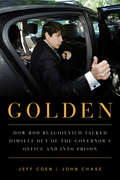- Table View
- List View
Going to War?: Trends in Military Interventions (Human Dimensions in Foreign Policy, Military Studies, and Security Studies)
by H. Christian Breede Stéfanie von HlatkyA multi-disciplinary study on wartime decision-making, with a focus on how Canada and its allies engage in conflict.
Going to Wipe their Tears
by Pyarelal"`Mahatma Gandhi: The Last Phase' deals with the last twenty-one months of Gandhiji's life, beginning with his release from detention in the Aga Khan's palace from August 1942 to May 1944. It is the last in the 10-volume tome by pyarelal, Gandhiji's faithful secretary for 28 years. The most memorable part of `the Last Phase' portrays the heart-rending communal divide across the sub-continent and Mahatma Gandhi's valiant, single-handed struggle to stand against the tornado of primitive passions. With what super-human strength did Gandhiji carry on the battle is summed up by Pyarelal in one panoramic stroke of the pen : ""During those fateful days like a Titan he rushed from one danger spot to another to prop up the crumbling heavens."" An attempt is made in `Going to Wipe Their' to condense the epic story of those days in 1946-47. That story has become signigicant as required reading for all of us in 2002 because the same ghastly communal conflagration of 55 years ago stares us in the face today. Gandhiji said that the barbarity and cruelty such as India winessed then had its origin in cowardice. Five and half decades later, out country is confronted today with the same barbarity rooted in the same cowardice. Pyarelal's labours in recpaturing the past could induce us to ponder pravely and act manfully in the present. This condensation has been undertaken by Mahendra Meghani. He had only recently condensed from the Gujarati translation of `The Last Phase', a 150 — page book `Aansu Loochhva Jaun Chhun', also published by Navajivan Trust. Within three months it sold over 10,000 copies. It would seem that the hour of such a book has come."
Going to the Dogs: The Story of a Moralist
by Erich Kastner Cyrus Brooks Rodney LivingstoneGoing to the Dogs is set in Berlin after the crash of 1929 and before the Nazi takeover, years of rising unemployment and financial collapse. The moralist in question is Jakob Fabian, "aged thirty-two, profession variable, at present advertising copywriter . . . weak heart, brown hair," a young man with an excellent education but permanently condemned to a low-paid job without security in the short or the long run.What's to be done? Fabian and friends make the best of it--they go to work though they may be laid off at any time, and in the evenings they go to the cabarets and try to make it with girls on the make, all the while making a lot of sharp-sighted and sharp-witted observations about politics, life, and love, or what may be. Not that it makes a difference. Workers keep losing work to new technologies while businessmen keep busy making money, and everyone who can goes out to dance clubs and sex clubs or engages in marathon bicycle events, since so long as there's hope of running into the right person or (even) doing the right thing, well--why stop? Going to the Dogs, in the words of introducer Rodney Livingstone, "brilliantly renders with tangible immediacy the last frenetic years [in Germany] before 1933." It is a book for our time too.
Going to the Mountain: Life Lessons from My Grandfather, Nelson Mandela
by Ndaba MandelaThe first-ever book to tell Nelson Mandela's life through the eyes of the grandson who was raised by him, chronicling Ndaba Mandela's life living with, and learning from, one of the greatest leaders and humanitarians the world has ever known. To the rest of the world, Nelson Mandela was a giant: an anti-apartheid revolutionary, a world-renowned humanitarian, and South Africa's first black president. To Ndaba Mandela, he was simply "Granddad." In Going to the Mountain, Ndaba tells how he came to live with Mandela shortly after he turned eleven--having met each other only once, years before, when Mandela was imprisoned at Victor Verster Prison--and how the two of them slowly, cautiously built a relationship that would affect both their lives in extraordinary ways. It wasn't an easy transition. Mandela had high expectations for those around him, especially his family, and Ndaba chafed at the strict rules and exacting guidelines in his grandfather's home. But at the same time--through overheard calls from foreign dignitaries as well as the Xhosa folk wisdom that his grandfather shared with him at every opportunity--Ndaba was learning how to be a man. On a scale both personal and epic, Ndaba's extraordinary journey mirrors that of South Africa's coming of age--from the segregated Soweto ghettos into which he was born to the privileged life in which he grew up and the turbulent yet exciting times in which he carries on his grandfather's legacy. Going to the Mountain is, in the end, a story about unlocking the power within each of us. It's a cautionary tale about how a child's life can go one way or the other, depending upon the intervention of a caring soul--and about the awesome power of love to serve as a catalyst for change.
Gold
by Brian FreemantleA Saudi prince&’s grab for wealth plunges the world&’s superpowers into chaosAs the first in line for the Saudi throne, Prince Tefwik Hassan cannot afford public embarrassment. So when he loses his fortune in a failed scheme to corner the world&’s reserves of silver, Hassan is left scrambling. To recoup his millions, he devises an intricate plan that spans the globe and involves players from the upper echelons of both American and Soviet power: Hassan begins buying gold. The plan requires incredible international coordination, from the wood-paneled halls of London banks, to the arid fields of South Africa, to the frigid wastes of the Soviet Union. Every greedy man in the world wants a piece of Prince Hassan&’s plot, and when such dangerous men turn on each other, pandemonium ensues. This ebook features an illustrated biography of Brian Freemantle including rare photos from the author&’s personal collection.
Gold Bar Bob: The Downfall of the Most Corrupt US Senator
by Isabel Vincent Thomas Jason Anderson"American politics at its sleaziest."—Publishers Weekly Power corrupts, and in the case of New Jersey Senator Robert Menendez, power—and boatloads of money—corrupted absolutely and led to the downfall of the Democratic Party.Senator Bob Menendez stands alone as the most corrupt US Senator in history. After corruption charges were dropped in a 2017 mistrial, he may have considered himself invincible. But when the Feds raided his home in June 2022, they found a gifted Mercedes Benz, more than $600,000 in cash, and thirteen gold bars stuffed in envelopes, clothes, and closets. It was an outrageous haul for a man who styled himself as a fierce anti-corruption crusader, an ambitious Democrat who overthrew his mob-connected predecessor and rose through the ranks to the House of Representatives and the Senate to serve as the Chairman of the Senate Foreign Relations Committee. From New York Post writer Isabel Vincent and government watchdog Thomas Jason Anderson comes the unbelievable story of a vast web of lies and a stunning conviction. Gold Bar Bob chronicles Menendez&’s politicking for profit as he enriched a network that included the New Jersey mafia and businessmen from the Caribbean, Latin America, and the Middle East. In exchange for personal and campaign contributions, Bob aided others to sway criminal prosecutions, defraud millions from Medicare, secure questionable visas, acquire government contracts and financial investments, obtain millions in firearms, and weaken Homeland Security. While Menendez was convicted of sixteen felony counts—including bribery, extortion, fraud, acting as a foreign agent, obstruction of justice, and several counts of conspiracy—there are still many secrets to unveil. After nearly a half-century political career, the lies will finally be unraveled about his family&’s origins, how his second wife may be part of his crimes, and how much he attempted to get away with.
Gold Medal Policing: Operational Readiness and Performance Excellence (Routledge Series on Practical and Evidence-Based Policing)
by Judy M. McDonaldThis straightforward, easy-to-understand textbook inspires tools for improving job performance, productivity, and morale in law enforcement. The groundbreaking first edition of Gold Medal Policing, inspired by work with Olympic athletes, confirmed the importance of mental readiness in frontline policing excellence. Partnerships with policing and related fields positioned Gold Medal Policing principles across recruitment, multilevel training, web-based learning, and field assessment.The second edition consolidates two decades of peer-reviewed research and training, reflecting new trends, lessons, contemporary issues, and proven tools. Drawing on insights from frontline officers recognized for their excellence, including coach officers, it introduces an Operational Readiness Framework rooted in scientific principles. This framework systematically assesses physical, technical, and mental readiness, creating a detailed police-specific profile. A comprehensive literature review informs current police preparedness practices. Mental readiness is upheld to strict, measurable standards, akin to traditional physical and technical readiness. Best practices from exceptional officers are isolated, and operational benchmarks and strategies are established. The ultimate result is to empower officers to excel in the practice of their profession.Gold Medal Policing is indispensable for law enforcement leaders, scholars, students, and aspiring officers.Questions about the research? Contact the author Judy McDonald at judy.mcdonald@uottawa.ca
Gold Metal Waters: The Animas River and the Gold King Mine Spill
by Brad T. Clark Pete McCormickGold Metal Waters presents a uniquely inter- and transdisciplinary examination into the August 2015 Gold King Mine spill in Silverton, Colorado, when more than three million gallons of subterranean mine water, carrying 880,000 pounds of heavy metals, spilled into a tributary of the Animas River. The book illuminates the ongoing ecological, economic, political, social, and cultural significance of a regional event with far-reaching implications, showing how this natural and technical disaster has affected and continues to affect local and national communities, including Native American reservations, as well as agriculture and wildlife in the region. This singular event is surveyed and interpreted from multiple diverse perspectives—college professors, students, and scientists and activists from a range of academic and epistemological backgrounds—with each chapter reflecting unique professional and personal experiences. Contributors examine both the context for this event and responses to it, embedding this discussion within the broader context of the tens of thousands of mines leaking pollutants into waterways and soils throughout Colorado and the failure to adequately mitigate the larger ongoing crisis. The Gold King Mine spill was the catalyst that finally brought Superfund listing to the Silverton area; it was a truly sensational event in many respects. Gold Metal Waters will be of interest to students and scholars in all disciplines, but especially in environmental history, western history, mining history, politics, and communication, as well as general readers concerned with human relationships with the environment. Contributors: Alane Brown, Brian L. Burke, Karletta Chief, Steven Chischilly, Becky Clausen, Michael A. Dichio, Betty Carter Dorr, Cynthia Dott, Gary Gianniny, David Gonzales, Andrew Gulliford, Lisa Marie Jacobs, Ashley Merchant, Teresa Montoya, Scott W. Roberts, Lorraine L. Taylor, Jack Turner, Keith D. Winchester, Megan C. Wrona, Janene Yazzie
Gold, Finance and Imperialism in South Africa, 1887–1902: A View from the Stock Exchange (Cambridge Imperial and Post-Colonial Studies)
by Mariusz LukasiewiczThis book provides a unique account of the financial and political history of the South African War by analysing the organisation and operations of the Johannesburg Stock Exchange (JSE), the oldest existing stock exchange in the African continent. Identifying the JSE as the nexus between international finance, South African gold mining and British imperialism, the book exposes the financial and political connections between Johannesburg, Pretoria, London, and Paris during the final stage of the imperial ‘scramble for southern Africa.’ Gold mining presented the South African Republic (ZAR) and the whole southern African regional economy with a long-term economic future and new prospects of industrialisation. However, this socio-economic transformation was dependent on extensive capital investments and the institutionalisation of a coercive labour regime based on racial discrimination. This monograph provides the first empirical examination of how international finance, imperial politics, and racialised industrial relations became entrenched in a key financial intermediary in colonial South Africa - first in Kimberley in the Cape Colony, and then in Johannesburg in the ZAR. By studying the Johannesburg capital market’s social microstructures, the author demonstrates how colonial and international financial intermediaries underwrote and financed the largest wave of mining investments in Africa prior to the First World War. Filling an important gap in literature on nineteenth-century British imperialism and Anglo-African-Afrikaner relations, this insightful book uses the JSE as a lens to carefully expose the structures and agency of global finance in the outbreak of the South African War, and the making of South Africa as a unified colonial state.
Gold, Oil and Avocados: A Recent History of Latin America in Sixteen Commodities
by Andy RobinsonThe past decade has seen major political upheaval in Latin America--from Brazil to Chile to Venezuela to Bolivia--but to understand what happened, ask first where your quinoa and lithium batteries came from...The 21st century began optimistically in Latin America. Left-leaning leaders armed with programs to reduce poverty and reclaim national wealth were seeing results—but as the aughts gave way to the teens, they began to fall like dominos. Where did the dreams of this "pink tide" go? Look no further than the original culprits of Latin American disenfranchisement: resource-rich land and unscrupulous extraction. Recounting the story commodity by commodity, Andy Robinson reveals what oxen have to do with the rise of Jair Bolsonaro, how quinoa explains the mob that descended on Evo Morales, and why oil is the culprit behind the protracted coup in Venezuela. In addition to the usual suspects like gold and bananas which underscored the original plunder of the Americas, Robinson also shows how a new generation of valuable resources—like coltan for smartphones, lithium for electric cars, and niobium for SpaceX rockets—have become important players in the fate of Latin America. And as the energy transition sets mineral prices soaring, Latin America remains at the mercy of the rollercoaster of commodity prices. In Gold, Oil, and Avocados, Robinson takes readers from the salt plains of Chile to the depths of the Amazonian jungle to stitch together the story of Latin America's last decade, showing how the imperial plunder of the past carries on today under a new name.
Gold, the Dollar and Watergate
by Onno de Beaufort WijnholdsThe book examines the problems that Nixon faced during his presidential term, focusing on economics but the role of politics is also highlighted. The convergence of the gold-dollar crises, oil crises and Watergate imbroglio posed a unique political and economic threat to global stability.
Gold: How Activism Transformed The Jewelry Industry (Resources)
by Michael John Bloomfield Roy MaconachieGold remains a highly prized and impactful resource within the global economy. From the insatiable demand for gold in the electronics that permeate our day-to-day lives to the environmental desolation driven by gold mining in the Amazon, the gold trade continues to touch the lives and livelihoods of people across the world. Bloomfield and Maconachie tell the intriguing story of the yellow metal, tracing the seismic shifts in the industry over the past few decades. They show how huge purchases of gold reserves by BRICS countries mark the shifting balance of power away from the West, and how rising affluence in India and China has led to a surging demand for gold jewellery, calling into question current approaches to make supply chains more responsible. Explaining why gold is so difficult to regulate and why it is only becoming more so, the authors suggest ways we could, collectively, make practices work better for the countless workers and communities who suffer at the producer end of the supply chain. Linking local to global, producer to consumer, and gold’s extraction from the Earth to the financial centres that fuel it, this book offers a probing analysis that reveals who wins and who loses and what this means for the future of gold.
Golda
by Elinor BurkettThis biography of Israel’s first female prime minister is “a fascinating examination of Golda Meir’s public and private selves” (Library Journal).Golda Meir was the first female head of state in the Western-aligned world and one of the most influential women in modern history. A blend of Emma Goldman and Martin Luther King Jr. in the guise of a cookie-serving grandmother, her uncompromising devotion to shaping and defending a Jewish homeland against dogged enemies and skittish allies stunned political contemporaries and transformed Middle Eastern politics for decades to follow. She outmaneuvered Richard Nixon and Henry Kissinger at their own game of Realpolitik, and led Israel through a bloody war even as she eloquently pleaded for peace, carrying her nation through its most perilous hours while she herself battled cancer.In this masterful biography, author and Academy Award–winning documentarian Elinor Burkett paints a vivid portrait of a legendary woman defined by contradictions: an iron resolve coupled with magnetic charm, a kindly demeanor that disguised a stunning hard-heartedness, and a complete dedication to her country that often overwhelmed her personal relationships.“Her engaging portrait of Meir shows history with a female, though not traditionally feminine, face.” —Baltimore Sun“A solidly researched, highly readable portrait of a mesmerizing but, according to Burkett, ultimately lonely woman.” —Publishers Weekly“Leavens the heavy-duty politics with intimate portraits of her personality . . . a welcome arrival to the history shelf.” —Booklist“If anybody has written a better-researched, better-written biography [of Meir], I am unaware of it.” —St. Petersburg TimesIncludes photographs
Golda Meir: A Strong Determined Leader (Women of Our Time)
by David AdlerWhen she was a schoolgirl, Golda Meir stood on a box on a street corner and made speeches about the need for a Jewish homeland. Golda devoted her life to the land that would become Israel, moving rocks and planting trees, arguing with workers, soldiers, and kings. From her childhood in Russia and America to her years as Israel's Prime Minister, Golda worked for her dream of shalom--peace.
Golda Meir: Israel's Matriarch (Jewish Lives)
by Deborah E. LipstadtA balanced biography of Golda Meir, who was both adored and abhorred, from award-winning author Deborah E. Lipstadt &“Comprehensive. . . . Always thoughtful. . . . A nuanced account of a leader whose influence endures in the Middle East.&”—Kirkus Review Golda Meir (1898–1978) was the first and only woman to serve as prime minister of Israel. She was born in Kiev into a childhood of poverty, hunger, and antisemitism. When she was five, her father left to find work in America, and a year later the family settled in Milwaukee, Wisconsin. As a teenager she became devoted to Labor Zionism, giving street-corner speeches, and her family&’s home became a destination for Zionist emissaries. Her love for Labor Zionism was so fervent that her boyfriend, Morris Meyerson (her future husband), was often in competition with her dedication to the cause. Zionism prevailed. In 1921, Golda left America for Palestine with Morris and her sister Sheyna. Though the reality of living in Palestine was far from the dream of Zionism, Meir settled on the kibbutz Merhavia and was swiftly appointed to the Histadrut (the General Organization of Hebrew Workers in Palestine). As an ally of the Zionist David Ben-Gurion, Meir played an important role in the Yishuv, the pre-state Jewish community in Palestine; proved an almost singular ability to connect and fundraise with diaspora Jewry, particularly Americans; and served in three pivotal positions following Israel&’s independence: labor secretary of the newly formed state, foreign minister, and Israel&’s fourth prime minister. In tracing the life of Golda Meir, acclaimed author Deborah E. Lipstadt explores the history of the Yishuv and Jewish state from the 1920s through the 1973 Yom Kippur War, all while highlighting the contradictions and complexities of a person who was only the third woman to serve as a head of state in the twentieth century.
Golden Bones: An Extraordinary Journey from Hell in Cambodia to a New Life in America
by Sichan SivWhile the United States battled the Communists of North Vietnam in the 1960s and '70s, the neighbouring country of Cambodia was attacked from within by dictator Pol Pot and the Khmer Rouge. The Khmer Rouge imprisoned, enslaved, and murdered the educated and intellectual members of the population, resulting in the harrowing "killing fields"–rice paddies where the harvest yielded nothing but millions of skulls. Young Sichan Siv–a target since he was a university graduate–was told by his mother to run and "never give up hope!" Captured and put to work in a slave labor camp, Siv knew it was only a matter of time before he would be worked to death–or killed. With a daring escape from a logging truck and a desperate run for freedom through the jungle, including falling into a dreaded pungi pit, Siv finally came upon a colorfully dressed farmer who said, "Welcome to Thailand." He spent months teaching English in a refugee camp in Thailand while regaining his strength, eventually Siv was allowed entry into the United States. Upon his arrival in the U.S., Siv kept striving. Eventually rising to become a U.S. ambassador to the United Nations, Siv returned with great trepidation to the killing fields of Cambodia in 1992 as a senior representative of the U.S. government. It was an emotionally overwhelming visit.
Golden Gates: Fighting for Housing in America
by Conor DoughertyA stunning, deeply reported investigation into the housing crisis Spacious and affordable homes used to be the hallmark of American prosperity. Today, however, punishing rents and the increasingly prohibitive cost of ownership have turned housing into the foremost symbol of inequality and an economy gone wrong. Nowhere is this more visible than in the San Francisco Bay Area, where fleets of private buses ferry software engineers past the tarp-and-plywood shanties where the homeless make their homes. The adage that California is a glimpse of the nation's future has become a cautionary tale.With propulsive storytelling and ground-level reporting, New York Times journalist Conor Dougherty chronicles America's housing crisis from its West Coast epicenter, peeling back the decades of history and economic forces that brought us here and taking readers inside the activist uprisings that have risen in tandem with housing costs. To tell this new story of housing, Dougherty follows a struggling math teacher who builds a political movement dedicated to ending single-family-house neighborhoods. A teenaged girl who leads her apartment complex against their rent-raising landlord. A nun who tries to outmaneuver private equity investors by amassing a multimillion-dollar portfolio of affordable homes. A suburban bureaucrat who roguishly embraces density in response to the threat of climate change. A developer who manufactures homeless housing on an assembly line.Sweeping in scope and intimate in detail, Golden Gates captures a vast political realignment during a moment of rapid technological and social change.
Golden Goose: The Story of a Peasant Family in Western China
by David Burnett Xu LiuThis book offers an intimate and personal look at what China's poverty alleviation has meant for individuals. The dramatic progress in reducing poverty in China over the past three decades is well known. According to the World Bank, more than 500 million people were lifted out of extreme poverty as China’s poverty rate fell from 88 percent in 1981 to 6.5 percent in 2012. Behind this statistic are the millions of families in rural China who have moved from extreme poverty to a more comfortable way of life in modern China. This is the story of four generations of one such family. Grandma Zhen and her eight children have faced the hardship of war, the great famine of 1958-1960, the Cultural Revolution of 1967-1977 and Opening-up and Reform. They have had to adjust to a rapidly changing culture that has affected all aspects of their lives, including marriage, the one-child policy, and education. Through incredible endurance and hard work, they have not only survived, but thrived. This book will be of value to anthropologists, developmental economists, sinophiles, and more.
Golden Handcuffs: The Secret History of Trump's Women
by Nina BurleighNew York Times bestselling author and award-winning journalist, Nina Burleigh, explores Donald Trump’s attitudes toward women by providing in-depth analysis and background on the women who have had the most profound influence on his life—the mother and grandmother who raised him, the wives who lived with him, and the daughter who is poised to inherit it all.Has any president in the history of the United States had a more fraught relationship with women than Donald Trump? He flagrantly cheated on all three of his wives, brushed off multiple accusations of sexual assault, publicly ogled his eldest daughter, bought the silence of a porn star and a Playmate, and proclaimed his now-infamous seduction technique: “grab ’em by the pussy.” Golden Handcuffs is a comprehensive and provocative account of the women who have been closest to Trump—his German-immigrant grandmother, Elizabeth, the uncredited founder of the Trump Organization; his Scottish-immigrant mother, Mary, who acquired a taste for wealth as a maid in the Andrew Carnegie mansion; his wives—Ivana, Marla, and Melania (the first and third of whom are immigrants); and his eldest daughter, Ivanka, groomed to take over the Trump brand from a young age. Also examined are Trump’s two older sisters, one of whom is a prominent federal judge; his often-overlooked younger daughter, Tiffany; his female employees; and those he calls “liars”—the women who have accused him of sexual misconduct. Of these women, Burleigh writes, “where they come from and what they do now and in the future matters because they have or have had the ear of the most powerful man on earth.”
Golden Lads: A Study of Anthony Bacon, Francis and Their Friends (Virago Modern Classics #114)
by Daphne Du MaurierFROM THE BESTSELLING AUTHOR OF REBECCA'A landmark book on a much-neglected figure, containing ground-breaking research . . . Vintage du Maurier - a page-turner, and a thundering good read!' Lisa JardineA fascinating historical figure, Anthony Bacon was a contemporary of the brilliant band of gallants who clustered round the court of Elizabeth I, and he was closely connected with the Queen's favourite, the Earl of Essex. He also worked as an agent for Sir Francis Walsingham, the Queen's spymaster, living in France where he became acquainted with Henri IV and the famous essayist Michel de Montaigne.It was in France that du Maurier discovered a secret that, if disclosed during Bacon's lifetime, could have put an end to his political career . . . Du Maurier did much to shed light on matters that had long puzzled historians, and, as well as a consummate exercise in research, this biography is also a strange and fascinating tale.
Golden Lads: A Study of Anthony Bacon, Francis and Their Friends (Vmc Ser. #655)
by Daphne Du MaurierFROM THE BESTSELLING AUTHOR OF REBECCA'A landmark book on a much-neglected figure, containing ground-breaking research . . . Vintage du Maurier - a page-turner, and a thundering good read!' Lisa JardineA fascinating historical figure, Anthony Bacon was a contemporary of the brilliant band of gallants who clustered round the court of Elizabeth I, and he was closely connected with the Queen's favourite, the Earl of Essex. He also worked as an agent for Sir Francis Walsingham, the Queen's spymaster, living in France where he became acquainted with Henri IV and the famous essayist Michel de Montaigne.It was in France that du Maurier discovered a secret that, if disclosed during Bacon's lifetime, could have put an end to his political career . . . Du Maurier did much to shed light on matters that had long puzzled historians, and, as well as a consummate exercise in research, this biography is also a strange and fascinating tale.
Golden Lads: Sir Francis Bacon, Anthony Bacon, and Their Friends
by Daphne Du Maurier"Daphne du Maurier has no equal." --Sunday TelegraphPrior to the publication of Golden Lads, Anthony Bacon was viewed as a footnote in the history of his younger brother, Francis. A fascinating historical figure in his own right, Anthony Bacon was a contemporary of the brilliant band of gallants who gathered around the court of Elizabeth I, was closely connected to the Earl of Essex, and worked in France as a spy for Sir Francis Walsingham. While living in France he became acquainted with Henri IV and the essayist Michel de Montaigne, and it was there that Daphne du Maurier discovered a secret that, if disclosed during Bacon's lifetime, could have put an end to his political career. Du Maurier did much to uncover the truth behind matters that had long puzzled Elizabethan historians, while telling a strange and fascinating tale.
Golden Rule: The Investment Theory of Party Competition and the Logic of Money-Driven Political Systems (American Politics And Political Economy Ser.)
by Thomas Ferguson"To discover who rules, follow the gold." This is the argument of Golden Rule, a provocative, pungent history of modern American politics. Although the role big money plays in defining political outcomes has long been obvious to ordinary Americans, most pundits and scholars have virtually dismissed this assumption. Even in light of skyrocketing campaign costs, the belief that major financial interests primarily determine who parties nominate and where they stand on the issues—that, in effect, Democrats and Republicans are merely the left and right wings of the "Property Party"—has been ignored by most political scientists. Offering evidence ranging from the nineteenth century to the 1994 mid-term elections, Golden Rule shows that voters are "right on the money." Thomas Ferguson breaks completely with traditional voter centered accounts of party politics. In its place he outlines an "investment approach," in which powerful investors, not unorganized voters, dominate campaigns and elections. Because businesses "invest" in political parties and their candidates, changes in industrial structures—between large firms and sectors—can alter the agenda of party politics and the shape of public policy.Golden Rule presents revised versions of widely read essays in which Ferguson advanced and tested his theory, including his seminal study of the role played by capital intensive multinationals and international financiers in the New Deal. The chapter "Studies in Money Driven Politics" brings this aspect of American politics into better focus, along with other studies of Federal Reserve policy making and campaign finance in the 1936 election. Ferguson analyzes how a changing world economy and other social developments broke up the New Deal system in our own time, through careful studies of the 1988 and 1992 elections. The essay on 1992 contains an extended analysis of the emergence of the Clinton coalition and Ross Perot's dramatic independent insurgency. A postscript on the 1994 elections demonstrates the controlling impact of money on several key campaigns. This controversial work by a theorist of money and politics in the U.S. relates to issues in campaign finance reform, PACs, policymaking, public financing, and how today's elections work.
Golden State
by Ben WintersFrom award-winning, New York Times bestselling novelist Ben H. Winters comes a mind-bending novel set in a world governed by absolute truth, where lies are as dangerous as murder.In a strange alternate society that values law and truth above all else, Laszlo Ratesic is a nineteen-year veteran of the Speculative Service. He lives in the Golden State, a nation standing where California once did, a place where like-minded Americans retreated after the erosion of truth and the spread of lies made public life and governance impossible.In the Golden State, knowingly contradicting the truth is the greatest crime--and stopping those crimes is Laz's job. In its service, he is one of the few individuals permitted to harbor untruths, to "speculate" on what might have happened.But the Golden State is less a paradise than its name might suggest. To monitor, verify, and enforce the truth requires a veritable panopticon of surveillance and recording. And when those in control of the facts twist them for nefarious means, the Speculators are the only ones with the power to fight back.
Golden: How Rod Blagojevich Talked Himself out of the Governor's Office and into Prison
by Jeff Coen John ChaseNo one did political corruption quite like Rod Blagojevich. The 40th governor of Illinois made international headlines in 2008 when he was roused from his bed and arrested by the FBI at his Chicago home. He was accused of running the state government as a criminal racket and, most shockingly, caught on tape trying to barter away President-elect Barack Obama's US Senate seat. Most politicians would hunker down, stay quiet, and fight the federal case against them. But as he had done for years, Rod Blagojevich proved he was no ordinary politician. Instead, he fueled the headlines, proclaiming his innocence on seemingly every national talk show and street corner he could find.Revealing evidence from the investigation never before made public, Golden is the most complete telling yet of the Blagojevich story, written by two Chicago reporters who covered every step of his rise and fall and spent years sifting through evidence, compiling documents, and conducting more than a hundred interviews with those who have known Blagojevich from his childhood to his time in the governor's office. Dispensing with sensationalism to present the facts about one of the nation's most notorious politicians, the authors detail the mechanics of the corruption that brought the governor down and profile a fascinating and frustrating character who embodies much of what is wrong with modern politics. With Blagojevich now serving 14 years in prison, the time has come for the last word on who Blagojevich was, how he was elected, how he got himself into trouble, and how the feds took him down.
